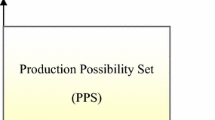Abstract
This paper deals with imprecise data in data envelopment analysis (DEA). We construct a new pair of mathematical programming models by using the concepts of ‘inf’ and ‘sup’ to calculate the exact values of the lower- and upper-bound efficiency scores in the presence of interval and ordinal data. The method proposed in this study is motivated by the approach introduced by Kao (Eur J Oper Res 174(2):1087–1099, 2006) where a pair of two-level mathematical DEA models are converted into linear programming (LP) models to calculate the lower- and upper-bound efficiency scores in the presence of pure ordinal data. We show that the LP model proposed by Kao (2006) for finding the lower-bound efficiency score yields the upper-bound efficiency score. We propose an improved model that overcomes this drawback and successfully calculates the lower- and upper-bound efficiency scores. We demonstrate the applicability of our models with a numerical example and exhibit its efficacy through comparison with Kao’s (2006) approach.


Similar content being viewed by others
References
Baumol WJ (1977) Economic theory and operations analysis. Prentice-Hall, Englewood Cliffs, NJ
Charnes A, Cooper WW, Rhodes E (1978) Measuring the efficiency of decision making units. Eur J Oper Res 2:429–444
Cooper WW, Park KS, Yu G (1999) IDEA and AR-IDEA: models for dealing with imprecise data in DEA. Manag Sci 45(4):597–607
Despotis DK, Smirlis YG (2002) Data envelopment analysis with imprecise data. Eur J Oper Res 140(1):24–36
Ebrahimi B, Khalili M (2018) A new integrated AR-IDEA model to find the best DMU in the presence of both weight restrictions and imprecise data. Comput Ind Eng 125:357–363
Ebrahimi B, Tavana M, Rahmani M, Santos-Arteaga FJ (2018) Efficiency measurement in data envelopment analysis in the presence of ordinal and interval data. Neural Comput Appl 30(6):1971–1982
Kao C (2006) Interval efficiency measures in data envelopment analysis with imprecise data. Eur J Oper Res 174(2):1087–1099
Khalili M, Camanho AS, Portela M, Alirezaee M (2010) The measurement of relative efficiency using data envelopment analysis with assurance regions that link inputs and outputs. Eur J Oper Res 203:761–770
Wang YM, Greatbanks R, Yang JB (2005) Interval efficiency assessment using data envelopment analysis. Fuzzy Sets Syst 153(3):347–370
Acknowledgements
The authors would like to thank the anonymous reviewers and the editor for their insightful comments and suggestions. Dr. Madjid Tavana is grateful for the partial support he received from the Czech Science Foundation (GAˇCR19-13946S) for this research.
Author information
Authors and Affiliations
Corresponding author
Ethics declarations
Conflict of interest
The authors declare that they have no conflict of interest.
Additional information
Publisher's Note
Springer Nature remains neutral with regard to jurisdictional claims in published maps and institutional affiliations.
Rights and permissions
About this article
Cite this article
Ebrahimi, B., Tavana, M. & Charles, V. A note and new extensions on “interval efficiency measures in data envelopment analysis with imprecise data”. Oper Res Int J 21, 2719–2737 (2021). https://doi.org/10.1007/s12351-019-00524-x
Received:
Revised:
Accepted:
Published:
Issue Date:
DOI: https://doi.org/10.1007/s12351-019-00524-x




